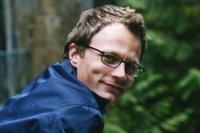Everything's Gone Coupland

The 25th annual Vancouver International Film Festival opened last Thursday, and boasts 500 screenings of 300 films over two weeks. It is one of the best-attended film festivals in North America, registering an average of 150,000 attendees in each of the last three years.
As you can imagine it can be a bit daunting to pick up the program catalogue and figure out what you want to see. It would take you almost a week just to read through all the synopses. So I adopted my usual approach of choosing a single film that I absolutely must see, a few more I really want to see, a couple of short-film programs and a documentary or two.
This afternoon Esther and I attended the must-see film on the list, Everything's Gone Green, which happens to be Vancouver novelist Douglas Coupland's screenwriting debut. I was tempted to call it, Douglas Coupland's Everything's Gone Green because while that kind of credit is usually reserved for the director, this is undeniably Coupland's film. And I think the filmmakers knew that going in. They gave credit where credit was due.
If you've read any of Coupland's books (or all of them) you'll immediately recognize the Couplandisms throughout Everything's Gone Green. The protagonist is a thirty-something slacker who finds himself suddenly disillusioned by life and the path he finds himself on, watching from the sidelines as his siblings and friends seem to fall ass-backwards into success and become exceedingly rich. A father who has been disposed of by a company he's given his life to and who finds himself too young to retire and too old to learn something new. Various doomed fringe characters living on the margins of society, engaged in nefarious occupations. Unconventional romance. And, of course, Vancouver.
What I appreciated most was that Vancouver was not made exceptionally beautiful. Much of the filming was done in the spring, and the city looks as it should. Like Vancouver. Which is to say wet, dark, green. Overpriced condos dominate the skyline. Mountain-tops disappear into the low clouds. And there are bridges to cross. There is a lot of fun made of Vancouver-as-film-set, made to stand in for Los Angeles, New York, Seattle, et al in thousands of films over the last decade. The protagonist's love interest is a set designer and talks about a palm-tree prop that has appeared in more movies of the week than Jane Seymour.
The film was good. I enjoyed it. So did Esther, and from the sounds of it, much of the sold-out theatre. Douglas Coupland was not in attendance. No wonder. He's just made the Giller Prize long list (new this year, the long list), with J-Pod, is preparing to open a play based on Life After God, his documentary, Souvenir of Canada, came out on DVD this week... I'm quite sure there's more, but suffice it to say the man is busy.




